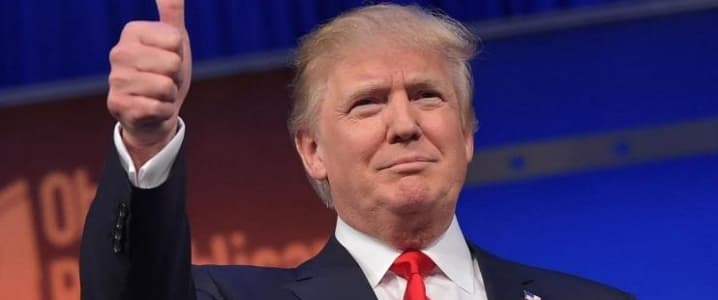U.S. President Donald Trump signed an executive order on Tuesday that would promote his “Buy American, Hire American” trade policy, an agenda that is worrying oil pipeline companies.
Trump’s executive order is vague in details. The “Buy American” part of the executive order seeks to tighten the standards in U.S. government procurement programs, which essentially means that federally-funded construction projects use more American-made goods. It is not at all clear how this will alter current policy. The administration wants to close what it sees as too many loopholes, such as nearly-finished imported goods being completed in the U.S. and then deemed to be “Made in America.”
The “Hire American” agenda calls for a reform of the H-1B visa program, which allows companies to hire skilled foreign workers.
The executive order, if carried out, would affect companies building oil pipelines in the U.S., requiring them to use U.S. steel in their projects. But the order is imprecise and incomplete, and fleshing out the specifics of the plan could take more than a year. Crucially, beyond the splashy headlines, Trump’s executive order is the start of a process, not the end of one. Moreover, all the order does is ask federal agencies to review certain rules; it doesn’t require them to necessarily do anything concrete.
Trump also made some comments on Tuesday that surely raised some eyebrows in the Canadian oil and gas industry. “And we're going to make some very big changes or we are going to get rid of NAFTA for once and for all. It cannot continue like this, believe me,” he said on Tuesday. Characteristically lacking in specifics, the President’s comments will only add to uncertainty. Related: Alaska Needs Much Higher Oil Prices To Reverse Its Oil Fortunes
The “Buy American, Hire American” plan might be helpful to steelmakers, but “I’m kind of skeptical it even happens,” Lee McMillan, an analyst with Clarksons Platou Securities, told Bloomberg in an interview.
Adding to the confusion is the administration’s tendency to contradict itself on a near-weekly basis. "We have cleared the way for the construction of the Keystone and Dakota Access pipelines -- thereby creating tens of thousands of jobs -- and I've issued a new directive that new American pipelines be made with American steel," Trump said during his highly-touted speech to a joint session of Congress on February 28.
It was a position he has taken multiple times since he became President. During a meeting with the CEO of U.S. Steel, Mario Longhi, a week earlier, President Trump was even more direct. "We put you heavy into the pipeline business because we approved, as you know, the Keystone pipeline and Dakota,” he told Longhi on February 23. “But they have to buy, meaning steel, so I'll say U.S. steel, but steel made in this country and pipelines made in this country."
But the Dakota Access Pipeline was more than 90 percent complete at that point. As for Keystone XL, much of the steel had already been purchased by TransCanada – in fact, it was purchased years ago and has been sitting idle in stockyards in North Dakota. Some of the steel came from the U.S., but a lot of it came from Canada, Italy and India. TransCanada will still need to buy a bunch of new steel for the pipeline, but much of it is likely to come from overseas because of the specialized parts needed, which aren’t available domestically, according to Reuters.
More importantly, a week after Trump told the joint session of Congress that Keystone XL would be using American-made steel, administration officials said Keystone XL will actually be exempt from the rules because it is not a “new” project.
But let’s put aside Keystone XL. Future pipeline projects might be more exposed to Trump’s “Buy American, Hire American” program. So it is no surprise that it is getting pushback from industry groups who fear cost inflation from local content rules. Top oil and gas groups have come out against the moves, including the American Petroleum Institute, the Independent Petroleum Association of America, the Association of Oil Pipelines, the American Fuel & Petrochemical Manufacturers, along with individual companies like Energy Transfer Partners and Williams Companies. In a public comment submitted on April 7, and reported on by DeSmogBlog, Energy Transfer Partners was pretty explicit about the effects of Trump’s “Buy American” provisions. “The impacts of such a restriction are expected to severely delay project schedules, drive up costs, decrease availability, and lower quality,” Energy Transfer Partners wrote in a comment to the Department of Commerce. Related: How Far Will OPEC Go For $60 Oil?
Even the effect on U.S. steel is not uniformly beneficial. The “Hire American” could push up labor costs for steelmakers. “We see Mr. Trump’s ‘Hire American’ initiative likely driving up the cost to make steel in the U.S., a likely headwind for domestic mills,” Gordon Johnson, an analyst at Axiom Capital Management, wrote in a research note.
Finally, even if the Trump administration managed to put in place really strict local content rules for pipelines, the directives could run afoul of WTO trade rules. In other words, it might not even be legal.
The “Buy American, Hire American” is a key component of Trump’s economic nationalism, but the oil and gas industry surely hopes it will quietly amount to very little.
By Nick Cunningham of Oilprice.com
More Top Reads From Oilprice.com:
- Oil Markets React Stoically To Crude Inventory Draw
- Why The Permian Doesn’t Keep OPEC Awake At Night
- Citi Sees $65 Oil By Christmas


















